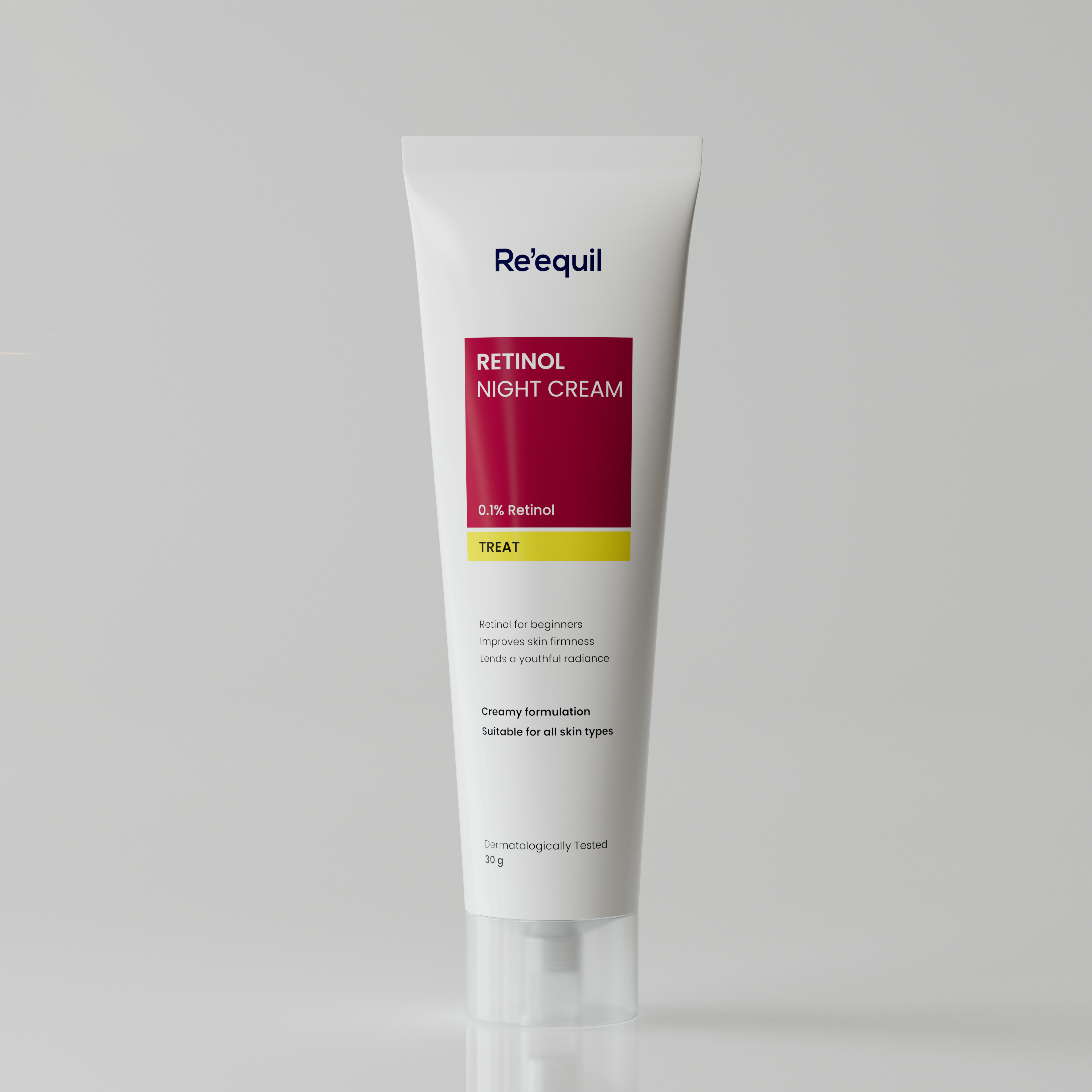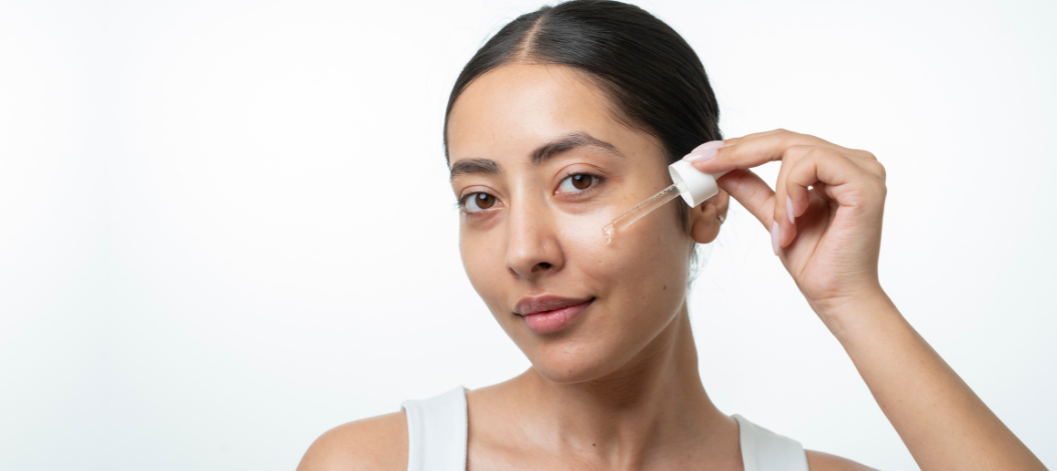Hyaluronic Acid: What is it and how it helps the skin
When it comes to hydrating the skin—there really isn’t any skincare ingredient that can do a better job than Hyaluronic Acid.
It is one of the most well-known skincare ingredients in the market today—and for all the good reasons.
It is typically found in skincare formulations targeting skin concerns like dryness and facial ageing.
There are 4 forms of Hyaluronic Acid available in cosmetic formulations
- Raw form. Has a higher molecular weight, and mostly stays on the top layer of the skin.
- Hydrolyzed form. Split into smaller fragments, has a lower molecular weight.
- Alkaline form, also called Sodium Hyaluronate. This one is the most effective form of Hyaluronic Acid. It has a lower molecular weight and penetrates deeper layers of the skin. Plus, it promotes the production of naturally occurring HA.
- Cross-linked form. Low molecular weight hyaluronic acid (HA) molecules are cross-linked to create a larger, more stable molecule.
READ - A complete guide on Hyaluronic Acid
Why you might need Hyaluronic Acid
Hyaluronic Acid, also known as Hyaluronan, is already present in our body—it is mainly found in our connective, epithelial and neural tissues.
According to a study, an individual weighing 70 kg has approximately 15g of Hyaluronan in the body.
Its prime job is to lubricate the joint and retain the essential moisture in our stratum corneum—the outermost layer of the skin.
With that comes a question—if we already have HA in our body—then what are these topical products for.
Here’s a catch!
As we age, Hyaluronic Acid in our body declines. Thus, skincare products containing HA can be a great addition to your skincare routine.
Hyaluronic Acid decreases skin irritation
HA contains healing properties, which can help minimise skin irritation.
According to a study, Hyaluronic Acid controls skin inflammation, speeding up the healing process.
Moreover, it increases blood flow to the areas where the skin barrier is compromised.
Reduces the appearance of fine lines and wrinkles
According to a 2012 study, hyaluronic acid moisturises the skin and improves skin elasticity, thus visibly decreasing the depth of wrinkles.
Moreover, a serum containing HA can improve smoothness, hydration, and the appearance of fine lines, according to a 2021 study.
The study was conducted on 40 females—which went on for 6 weeks—none reported skin irritation or any side effect from Hyaluronic Acid.
HA improves the penetration of other active ingredients
If you happen to use any active ingredient, Hyaluronic Acid can enhance the penetration of the active ingredient through the stratum corneum.
Basically, HA can enhance the efficacy of an active ingredient.
Is Hyaluronic Acid good for oily skin?
Hyaluronic Acid can help with one of the most underlying issues of oily skin—which is excess sebum production.
Excess sebum is the primary cause of acne, skin inflammation, and a greasy, shiny appearance.
According to a 2017 study, Hyaluronic Acid plays a vital role in regulating sebum production.
The study was conducted on 20 individuals with oily skin—it concluded that Hyaluronic Acid is an effective candidate in controlling sebum production.
With that, we can say that Hyaluronic Acid is a good choice of ingredient for oily skin. It can provide hydration and prevent moisture loss.
Moreover, the comedogenicity index of HA is 0. Meaning, it will not clog pores or cause any acne breakouts.
Should someone with acne-prone skin use Hyaluronic Acid?
Absolutely yes!
Hyaluronic Acid does not irritate the skin at all. Plus, it can help with inflammation and redness—typical cans of worms for someone with acne-prone skin.
However, Hyaluronic Acid is not the right choice of ingredient to target active acne.
HA might prevent acne breakouts because it helps in regulating sebum production.
Aside from that, Hyaluronic Acid doesn’t play a significant role in treating acne.
If you want a more targeted approach for your acne, look for skincare formulations containing Salicylic Acid, Niacinamide, or Retinol.
Does Hyaluronic Acid have any side effects?
No, Hyaluronic Acid does not have any adverse effects, it is safe for use on all skin types, including sensitive skin.
You can use it every day, twice a day in your AM and PM skincare routine.
What are the other skincare ingredients suitable for oily or acne-prone skin?
Other than Hyaluronic Acid, there are various active ingredients that can help regulate sebum production and prevent and treat acne—here are they
Niacinamide. Highly effective in regulating sebum production and reducing the severity of acne.
A 2006 study proves that Niacinamide can effectively decrease sebum excretion rates.
Moreover, Niacinamide contains anti-inflammatory properties, which can reduce the severity of acne and help with facial redness and skin inflammation.
READ - Should Niacinamide be in your skincare routine if you have oily skin?
Salicylic Acid. Effective daily approach to treat acne.
A 2012 study says Salicylic Acid, especially in cleansers, is highly suitable for treating acne.
The study was conducted on individuals with mild to moderate acne, and each individual reported significant improvements in acne lesions.
Salicylic Acid also has anti-inflammatory properties that help soothe inflammation, itchiness, and facial redness.
Retinol. Efficacious on both non-inflammatory and inflammatory acne lesions.
Retinol helps keep your pores clear by removing dead skin cells. For oily skin, it also helps regulate excess sebum, preventing clogged pores.
READ - How Effective is Retinol for Treating Acne?
Moreover, Retinol accelerates collagen and elastin production in the skin, reducing the appearance of enlarged pores and acne scars.
References
Papakonstantinou, E., Roth, M., & Karakiulakis, G. (2012). Hyaluronic acid: A key molecule in skin aging. Dermato-Endocrinology, 4(3), 253-258.
Draelos, Z. D., Diaz, I., Namkoong, J., Wu, J., & Boyd, T. (2021). Efficacy Evaluation of a Topical Hyaluronic Acid Serum in Facial Photoaging. Dermatology and Therapy, 11(4), 1385-1394.
Jung YR, Hwang C, Ha JM, Choi DK, Sohn KC, Lee Y, Seo YJ, Lee YH, Kim CD, Lee JH, Im M. Hyaluronic Acid Decreases Lipid Synthesis in Sebaceous Glands. J Invest Dermatol. 2017 Jun;137(6):1215-1222. doi: 10.1016/j.jid.2017.01.017. Epub 2017 Feb 3. PMID: 28163068.
Draelos ZD, Matsubara A, Smiles K. The effect of 2% niacinamide on facial sebum production. J Cosmet Laser Ther. 2006 Jun;8(2):96-101. doi: 10.1080/14764170600717704. PMID: 16766489.
Stern R. Hyaluronan catabolism: a new metabolic pathway. Eur J Cell Biol. 2004 Aug;83(7):317-25. doi: 10.1078/0171-9335-00392. PMID: 15503855.






























